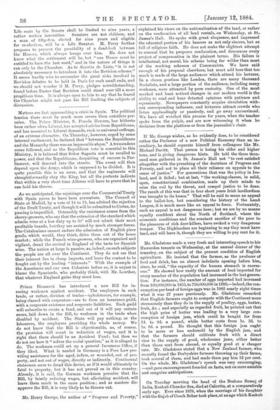Prince Bismarck has introduced a new Bill for in- suring
workmen against accident. The employers in each trade, or rather, division of trades—upholsterers, for example, being classed with carpenters—are to form an insurance guild, with a corporate existence and corporate liabilities. Each guild will subscribe to create a fund, and out of it will pay certain sums, laid down in the Bill, to workmen in the trade when disabled by accident. The State will pay nothing, or the labourers, the employers providing the whole money. We do not know that the Bill is objectionable, as, of course, the provision will count in reduction of wages, and it is right that there should be an Accident Fund; but then we do not see how it " selves the social question," as it is alleged to do. The workmen could set up a general Insurance Office, if they liked. What is needed in Germany is a Poor Law pro- viding assistance for the aged, infirm, or wounded, out of pro- perty, and not out of wages, directly or indirectly. Continental statesmen seem to dread this device, as if it would ultimately be fatal to property, but it has not proved so in this country. Already, it is said, the German workmen perceive that the Bill, by faintly reducing wages, but alleviating accident, will leave them much in the same position ; and as masters dis- approve the Bill, it is very likely to be thrown out.






































 Previous page
Previous page